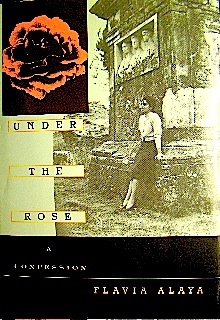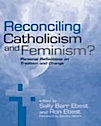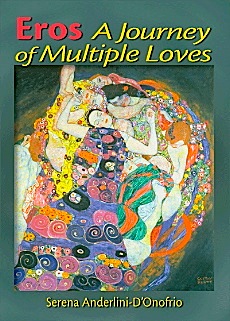


All right, I’ll cop to it: I could have brought our ongoing series on how to construct various stripes of winning conference pitches to a close last Friday; I had, after all, covered all of the basics of writing both formal and informal pitches. So I could, as promised, launch right into a new series today, showing you how to use the lessons we’ve just learned in pulling together one heck of a query letter.
But I’m not going to do that — at least not today. Why not? Well, I visit conference pitching here on the site only once per year — a long visit, admittedly, of the type that may well make some of you long for the houseguests to go home, already, but still, I don’t talk about it that often.
Perhaps that’s a mistake, since writers’ conference attendance has been skyrocketing of late. Blame the hesitant economy; writing a book is a LOT of people’s fallback position. Interesting, given how few novelists actually make a living at it, but hey, a dream’s a dream.
The problem is, literary conferences can be pretty hard to navigate your first time around — and that’s unfortunate, because the darned things tend not to be inexpensive. Like pitching and querying, there are some secret handshakes that enable some aspiring writers to hobnob more effectively than others, as well as norms of behavior that may seem downright perplexing to the first-time attendee.
Up to and including the fact that there’s more to getting the most out of a conference than just showing up, or even showing up and pitching.
For the next week or so, then, I’m going to be talking about the nuts and bolts of conference attendance, with an eye to helping you not only pitch more successfully, but also take advantage of the often amazing array of resources available to aspiring writers at a good conference. Not to mention feeling more comfortable in your skin while you’re there.
So it’s out with the old series and in with the new. Everybody ready? Goo.
Last week, I brought up a couple of the more common conceptual stumbling-blocks writers tend to encounter while prepping their elevator speeches and formal pitches. The first and most virulent, of course, is coming to terms with the necessity of marketing one’s writing at all — in other words, to begin to think of it not just as one’s baby, but as a product you’re trying to sell.
Half of you just tensed up, didn’t you?
I’m not all that surprised. From an artistic perspective, the only criterion for whether an agent or editor picks up a manuscript should be the quality of the writing, followed distantly by the inherent interest of the story. For many writers, the burning question of whether a market for the book already demonstrably exists doesn’t even crop up during the composition process; they write because they are writers.
Naturally, it comes as something of a shock to learn that books do not get published simply because someone has taken the trouble to write them — or even because they are well-written. The sad fact is, an aspiring writer must make the case that this is not only a great yarn, but one that will fit into the current book market neatly, BEFORE anyone in the industry is willing to take a gander at the actual writing.
I know, I know: it seems backwards. But as I believe I have mentioned 1700 times before, I did not set up the prevailing conditions for writers; I merely try to cast them in comprehensible terms for all of you.
If I ran the universe — which, annoyingly, I evidently still don’t, as nearly as I can tell — writers would be able to skip the pitch-and-query stage entirely, simply submitting the manuscripts directly with no marketing materials, to allow the writing to speak for itself. Every submitter would get thoughtful, helpful, generous-minded feedback, too, and enchanted cows would wander the streets freely, giving chocolate- and strawberry-flavored milk to anyone who wanted it.
Being omniscient, I would also naturally be able to tell you why the industry is set up this way. Heck, I’d be so in the know that I could explain why Nobel Prize winner José Saramago is so hostile to the conventions of punctuation that he wrote an entire novel, SEEING, without a single correctly punctuated piece of dialogue.
I would be THAT generous a universe-ruler.
But I do not, alas, run the universe, however, so Señor Saramago and certain aspects of the publishing industry remain mysteries eternal. (Would it kill him to use a period at the end of a sentence occasionally? Or a question mark at the end of a question?)
Long-time readers, chant it with me now: if a writer hopes to get published, the marketing step is a necessity, NO MATTER HOW TALENTED YOU ARE. Even if you were Stephen King, William Shakespeare, and Madame de Staël rolled into one, in the current writers’ market, you would still need to approach many, many agents and/or editors to find the right match for your work.
And even if you approach an agent who does in fact ask writers to send pages along with the initial query, instead of by special request afterward (as used to be universal), if the marketing approach is not professionally crafted, chances are slim that those pages will even get read. Remember, a good agency typically receives somewhere between 800 and 1200 queries per week; if Millicent the agency screener isn’t wowed by the letter, she simply doesn’t have time to cast her eyes over those 5 or 10 or 50 pages the agency’s website said that you could send.
No, that’s not being mean; that’s trying to get through all of those queries without working too much overtime.
Unfortunately, the same imperative to save time usually also dictates form-letter rejections that the querier entirely in the dark about whether the rejection trigger was in the query or the pages. (Speaking of realistic expectations, please tell me that you didn’t waste even thirty seconds of YOUR precious time trying to read actual content into it didn’t grab me, I just didn’t fall in love with it, it doesn’t meet our needs that this time, or any of the other standard rejection generalities. By definition, one-size-fits-all reasons cannot possibly tell you how to improve your submission.)
All of which is to say: please, I implore you, do not make the very common mistake of believing that not being picked up by the first agent whom you pitch or query means that your work is not marketable. Or adhering to the even more common but less often spoken belief that if a book were REALLY well written, it would somehow be magically exempted from the marketing process.
It doesn’t, and it isn’t. Everyone clear on that?
Why am I bringing this up now, at the end of a long, difficult series on cobbling together a pitch? Because unfortunately, unrealistic expectations about the pitching — and querying — process can and do not only routinely make aspiring writers unhappy at conferences the world over, but frequently also prevent good writers from pitching well.
Yes, you read that correctly. Misinformation can really hurt a writer — as can a fearful or resentful attitude. Part of learning to pitch — or query — successfully entails accepting the fact that from the industry’s point of view, you are presenting a PRODUCT to be SOLD.
Not, as the vast majority of writers believe, and with good reason, a piece of one’s soul ripped off without anesthesia.
So it is a TEENY bit counter-productive to respond — as an astonishingly high percentage of first-time pitchers do — to the expectation that they should be able to talk about their books in market-oriented terms as evidence that they are dealing with Philistines who hate literature.
To clear up any possible confusion: you’re not, and they don’t.
That doesn’t mean the situation doesn’t beg certain questions, however. Why, for instance, do so many pitchers respond to the pros as though they were evil demons sent to earth for the sole purpose of tormenting the talented and rewarding the illiterate? Or why even mention in a pitch or query that the book has been rejected before, or that its author has submitted 700 queries for it already?
Selling books is how agents and editors make their livings, after all: they HAVE to be concerned about whether there’s a market for a book they are considering. They’re not being shallow; they’re being practical.
Okay, MOST of them are not just being shallow. My point is, a pitching appointment is not the proper venue for trying to change the status quo. Querying or pitching is hard enough to do well without simultaneously decrying the current realities of book publishing.
And yes, in response to that question your brain just shouted, aspiring writers DO bring that up in their pitches and queries. All the time. Don’t emulate their example.
This isn’t just poor strategy, I suspect — it’s symptomatic of a fundamental misunderstanding of what makes an author successful. Selling is a word that many writers seem to find distasteful when applied to trying to land an agent, as if there were no real distinction between selling one’s work (most of the time, the necessary first step to the world’s reading it) and selling out (which entails a compromise of principle.)
C’mon — you know what I’m talking about; if not, just bring up the issue over a sandwich at your next writers’ conference.
When aspiring writers speak of marketing amongst themselves, it tends to be with a slight curl of the lip, an incipient sneer, as if the mere fact of signing with an agent or getting a book published would be the final nail in the coffin of artistic integrity. While practically everyone who writes admires at least one or two published authors — all of whom, presumably, have to deal with this issue at one time or another — the prospect of compromising one’s artistic vision haunts many a writer’s nightmares.
That’s a valid fear, I suppose, but allow me to suggest another, less black-and-white possibility: fitting the square peg of one’s book into the round holes of marketing can be an uncomfortable process. But that doesn’t mean it is inherently deadly to artistic integrity — and it doesn’t mean that any writer, no matter how talented, can legitimately expect to be commercially successful without going through that process.
That is not to say there are not plenty of good reasons for writers to resent how the business side of the industry works — there are, and it’s healthy to gripe about them. Resent it all you want privately, or in the company of other writers.
But do not, I beg you, allow that resentment to color the pitch you ultimately give. Or the query letter.
I know, I know: if you’ve been hanging out at conferences for a while, deep-dyed cynicism about the book market can start to sound a whole lot like the lingua franca. One can get a lot of mileage, typically, out of being the battle-scarred submission veteran who tells the new recruits war stories — or the pitcher in the group meeting with an editor who prefaces his comments with, “Well, this probably isn’t the right market for this book concept, but…”
But to those who actually work in the industry, complaining about the current market’s artistic paucity will not make you come across as serious about your work — as it tends to do amongst other writers, admittedly. Instead, it’s likely to insult the very people who could help you get beyond the pitching and querying stage.
Yes, you may well gulp. To an agent’s ears, such complaints tend to sound more like a lack of understanding of how books actually get published than well-founded critique of a genuinely difficult-to-navigate system.
Besides, neither a pitch meeting nor a query letter is primarily about writing, really: they’re both about convincing agents and editors that here is a story or topic that can sell to a particular target audience.
Yes, you read that correctly — and out comes the broken record again: contrary to what the vast majority of aspiring writers believe, the goal of the pitch (and the query letter) is NOT to make the business side of the industry fall in love with your WRITING, per se — it’s to get the agent or editor to whom it is addressed to ASK to see the written pages.
Then, and only then, is it logically possible for them to fall in love with your prose stylings or vigorous argument. I’ve said it before, and I’ll doubtless say it again: no one in the world can judge your writing without reading it.
This may seem obvious — especially to those of you who read my comments-in-passing on the subject earlier in this series — outside the context of a pitching or querying experience, but it’s worth a reminder during conference season. Too many writers walk out of pitching meetings or recycle rejections from queries believing, wrongly, that they’ve just been told that they cannot write.
It’s just not true — but by the same token, a successful verbal pitch or enthusiastically-received query letter is not necessarily a ringing endorsement of writing talent, either. Both are merely the marketing materials intended to prompt a request to see the writing itself.
Which means, of course, that if you flub your pitch, you should not construe that as a reflection of your writing talent, either; logically, it cannot be, unless the agent or editor takes exception to how you construct your verbal sentences.
I know, I know, it doesn’t feel that way at the time, and frankly, the language that agents and editors tend to use at moments like these (“No one is buying X anymore,” or “I could have sold that story ten years ago, but not now”) often DOES make it sound like a review of your writing.
But it isn’t; it can’t be.
All it can be, really, is a statement of belief about current and future conditions on the book market, not the final word about how your book will fare there. Just as with querying, if an agent or editor does not respond to your pitch, just move on to the next on your list.
Does all of that that make you feel any better about the prospect of walking into a pitch meeting? Did it, at any rate, permit you to get good and annoyed at the necessity of pitching and querying, to allow all of that frustration to escape your system?
Good. Now you’re ready to prep your pitch.
Did I just sense some eye-rolling out there? “But Anne,” I hear some chronically sleep-deprived preppers cry, “can’t you read a calendar? I’ve been working on my pitch for WEEKS now. I keep tinkering with it; I know I have the perfect pitch in me, but I can’t seem to bring it out.”
I know precisely what you mean — after staring for so long at a single page of text (which is, after all, what a formal pitch ends up being, at most), it can feel like it’s taken over one’s life.
One of the dangers of being embroiled for too long in the editorial process, I find, is becoming a bit too literal in one’s thinking. As with any revision process, either on one’s own work or others’, one can become a touch myopic, both literally and figuratively.
How myopic, you ask? Let me share an anecdote of the illustrative variety.
A couple of years ago, I went on a week-long writing retreat in another state in order to make a small handful of revisions to a novel of mine. Small stuff, really, but my agent was new to the project and wanted me to give the work a slightly different spin before he started submitting it. (He had taken it over from another agent within my agency — and for the benefit of those of you who just clutched your chests and whimpered that you thought you were getting into a life-long relationship: authors get reassigned within agencies all the time, especially if they write within more than one book category.)
Basically, he wanted it to sound a bit more like his type of book, the kind editors had grown to expect from his submissions. Perfectly legitimate, of course (if it doesn’t sound like that to you, please see both the GETTING GOOD AT ACCEPTING FEEDBACK and HOW TO BE AN AGENT’S DREAM CLIENT categories on the list at right before you even consider getting involved with an agent), and I’m glad to report that the revisions went smoothly.
At the end of my week of intensive revision, a friend and her 6-year-old daughter were kind enough to give me, my computer, and my many empty bottles of mineral water (revision is thirsty work, after all, and the retreat did not offer glass recycling, believe it or not) a ride back from my far-flung retreat site. Early in the drive, my friend missed a turn, and made a slight reference to her Maker.
Nothing truly soul-blistering, mind you, just a little light taking of the Lord’s name in vain. Fresh from vacation Bible school, her daughter pointed out, correctly, that her mother had just broken a commandment and should be ashamed of herself. (Apparently, her school hadn’t yet gotten to the one about honoring thy father and thy mother.)
“Not if God wasn’t capitalized,” I said without thinking. “If it’s a lower-case g, she could have been referring to any god. Apollo, for instance, or Zeus. For all we know, they may kind of like being called upon in moments of crisis. It could make them feel important.”
Now, that was a pretty literal response, and one that I subsequently learned generated a certain amount of chagrin when the little girl repeated it in her next Sunday school class. Not that I wasn’t technically correct, of course — but I should have let the situation determine what is an appropriate response.
Sometimes, you just have to go with the flow.
That’s true in pitching, too, you know. (You were wondering how I was going to work this back to the topic at hand, weren’t you?) Hyper-literalism can cause quite a bit of unnecessary stress during conference prep as well.
In part, that’s the nature of the beast: since aspiring writers are not told nearly enough about what to expect from a pitching appointment (or a potential response to a query), they tend to grasp desperately at what few guidelines they are given, following them to the letter.
And to a certain extent, that makes perfect sense: when going into an unfamiliar, stressful situation, it’s natural to want to cling to rules.
The trouble is, as I have pointed out throughout this series, not everything writers are told about pitching, querying, or even — dare I say it? — what does and doesn’t sell in writing is applicable, or even up-to-date. Adhering too closely to rules that many not be appropriate to the situation at hand can actually be a liability.
Anyone who has ever attended a writers’ conference has seen the result: the causalities of hyper-literalism abound.
Let me take you on a guided tour: there’s the writer who lost precious hours of sleep last night over the realization that her prepared pitch is four lines long, instead of three; there’s the one who despairs because he’s been told that he should not read his pitch, but memorize it. The guy over here is working so many dashes, commas, and semicolons into his three-sentence pitch that it goes on for six minutes with only three periods. In another corner mopes the romance writer who has just heard an agent say that she’s not looking for Highland romances anymore — which, naturally, the writer hears as NO ONE’s looking to acquire them.
You get the picture. As writers listen to litanies of what they are doing wrong, and swap secrets they have learned elsewhere, the atmosphere becomes palpably heavy with depression.
By the end of the conference, after the truisms all of these individuals have been shared, bounced around, and mutated like the messages in the children’s game of Telephone, and after days on end of every word each attending agent, editor, and/or teacher says being treated with the reverence of Gospel, there is generally a whole lot of rule-mongering going on.
Take a nice deep breath. The industry is not trying to trick you into giving the wrong answer.
What it IS trying to do is get you to adhere to under-advertised publishing norms. While some of those norms are indeed inflexible — the rigors of standard manuscript format, for instance — most of the time, you are fine if you adhere to the spirit of the norm, rather than its letter.
In other words: at a conference, try not to take every piece of advice you hear literally. (Except that one about keeping your query letter down to a single page.)
So those of you who are freaking out about a few extra words in your elevator speech: don’t. It needs to be short, but it is far better to take an extra ten seconds to tell your story well than to cut it so short that you tell it badly.
Yes, you read that one correctly, to: no agent or editor in the world is going to be standing over you while you pitch, abacus in hand, ready to shout at you to stop once you reach 101 words in a hallway pitch, any more than he will be counting its periods.
Admittedly, they may begin to get restive if you go on too long — but in conversation, length is not measured in number of words or frequency of punctuation. It is measured in the passage of time.
Let me repeat that, because I think some reader’s concerns on the subject are based in a misunderstanding born of the ubiquity of the three-sentence pitch: the purpose of keeping the elevator speech to 3-4 sentences is NOT because there is some special virtue in that number of sentences, but to make sure that the elevator speech is SHORT, brief enough that you could conceivably blurt it out in 30-45 seconds.
To recast that in graphic terms, the elevator speech should be short enough to leave your lips comprehensibly between the time the elevator shuts on you and the agent of your dreams on the ground floor and when it opens again on the second floor.
Remember, though, that no matter what you may have heard, AN ELEVATOR SPEECH IS NOT A FORMAL PITCH, but a shortened version of it. The elevator speech, hallway pitch, and pitch proper are primarily differentiated by the length of time required to say them.
So if you feel the urge to be nit-picky, it actually makes far more sense to TIME your pitch than it does to count the words.
Try to keep your elevator speech under 45 seconds, your hallway pitch to roughly 60 – 75 seconds max, and your pitch proper to 2 minutes or so. While these may not seem like big differences, you can say a lot in 30 seconds.
But DO NOT, I beg you, rend your hair in the midnight hours between now and your next pitching opportunity trying to figure out how to cut your pitch from 2 minutes, 15 seconds down to 2, or plump it up from a minute seventeen to 2, just because I advise that as a target length.
I’m not going to be standing there with a stopwatch, after all, any more than an agent is — and no matter what any writing guru tells you, none of us advice-givers is right 100% of the time. Don’t treat any rule that any of us give you as inviolable.
Seriously, not even mine. While I am fortunate enough to enjoy a large acquaintance in the industry, until I rule the universe, I can pretty much guarantee that no agent or editor, even my own, is ever going to say, “Well, that WOULD have been a great pitch, but unfortunately, it was 17.4 seconds longer than Anne Mini says it should be, so I’m going to have to pass.”
Even if I DID rule the universe (will someone get on that, please?), no one would ever say that to you. It’s in your best interest to adhere to the spirit of my advice on the pitch — or anyone else’s — not necessarily the letter.
How might one go about doing that? Well, remember that elevator speech I wrote a couple of weeks ago for PRIDE AND PREJUDICE? No? Okay, here it is again:
19th-century 19-year-old Elizabeth Bennet has a whole host of problems: a socially inattentive father, an endlessly chattering mother, a sister who spouts aphorisms as she pounds deafeningly on the piano, two other sisters who swoon whenever an Army officer walks into the room, and her own quick tongue, any one of which might deprive Elizabeth or her lovely older sister Jane of the rich husband necessary to save them from being thrown out of their house when their father dies. When wealthy humanity-lover Mr. Bingley and disdainful Mr. Darcy rent a nearby manor house, Elizabeth’s mother goes crazy with matchmaking fever, jeopardizing Jane’s romance with Bingley and insisting that Elizabeth marry the first man who proposes to her, her unctuous cousin Mr. Collins, a clergyman who has known her for less than a week. After the family’s reputation is ruined by her youngest sister’s seduction by a dashing army officer, can Elizabeth make her way in the adult world, holding true to her principles and marrying the man she passionately loves, or will her family’s prejudices doom her and Jane to an impecunious and regretful spinsterhood?
Because I love you people, I went back and timed how long it would take me to say: sixty- two seconds, counting gestures and vocal inflections that I would consider necessary for an effective performance.
That’s perfectly fine, for either a hallway speech or pitch proper. Actually, for a pitch proper, I would go ahead and add another sentence or two of glowing detail.
To be fair, though, it is a bit long for an elevator speech, if I intended to include any of the first hundred words as well. If I had just spent a weekend prowling the halls of the Conference-That-Shall-Not-Be-Named, for instance, buttonholing agents for informal hallway pitches, I would have tried to shear off ten seconds or so, so I could add at the beginning that the book is women’s fiction and the title.
Oh, and to have the time to indicate that my parents loved me enough to give me a name, and manners enough to share it with people when I first meet them.
But seriously, I would not lose any sleep over those extra ten seconds, if I were pinched for time. Nor should you.
To do so would be a literal reaction to the dicta of the proponents of the three-sentence pitch, those scary souls who have made many writers frightened of adding interesting or even necessary details to their pitches. They don’t do this to be malicious, really: they are espousing the virtue of brevity, which is indeed desirable.
It is not, however, the ONLY virtue a pitch should have, any more than every single-page letter in the world is automatically a stellar query.
Pull out your hymnals, everybody, and sing along: if you’re marketing a novel, you need to demonstrate two things: that this is a good story, and that you are a good storyteller. Similarly, if you are pitching a NF book, you need to show in your pitch that this is a compelling topic, and that you are the world’s best person to write about it.
As any good storyteller can tell you, compelling storytelling lies largely in the scintillating details. I have been listening to writers’ pitches for significantly longer than I have been giving them myself (in addition to my adult professional experience, I also spent part of my wayward youth trailing a rather well-known writer around to SF conventions; aspiring writers were perpetually leaping out from behind comic books and gaming tables to tell him about their books), so I can tell you with authority:
Far more of them fail due to being full of generalities than because they have an extra fifteen seconds’ worth of fascinating details.
Embrace the spirit of brevity, not the letter. If you must add an extra second or two in order to bring in a particularly striking visual image, or to mention a plot point that in your opinion makes your book totally unlike anything else out there, go ahead and do it.
Revel in this being the one and only time that any professional editor will EVER tell you this: try not to be too anal-retentive about adhering to pre-set guidelines. It will only make you tense.
As the song says, spirits high, pulses low. Keep up the good work!
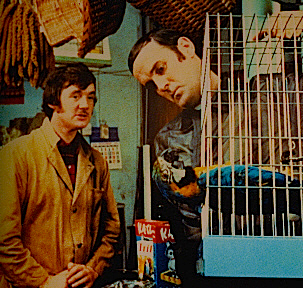

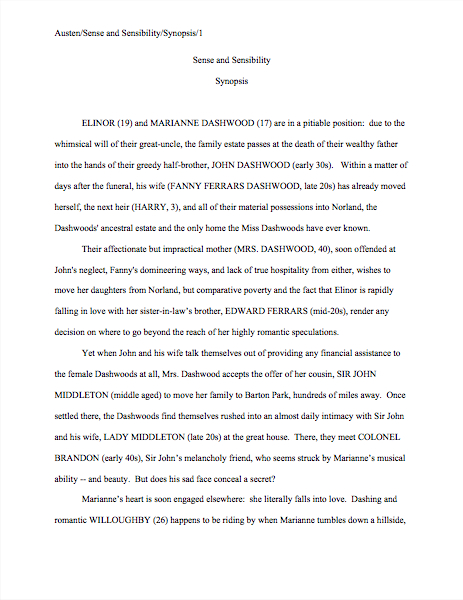
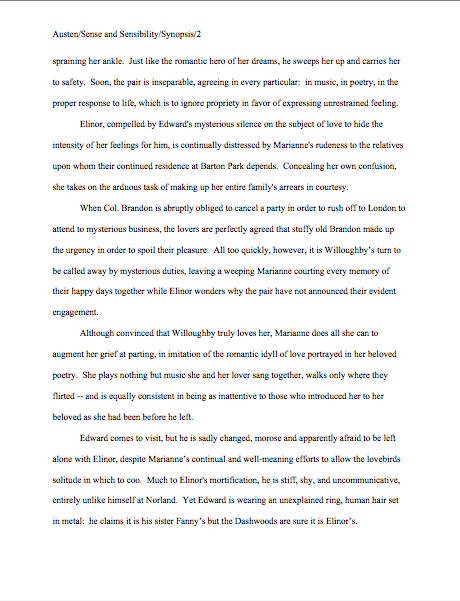
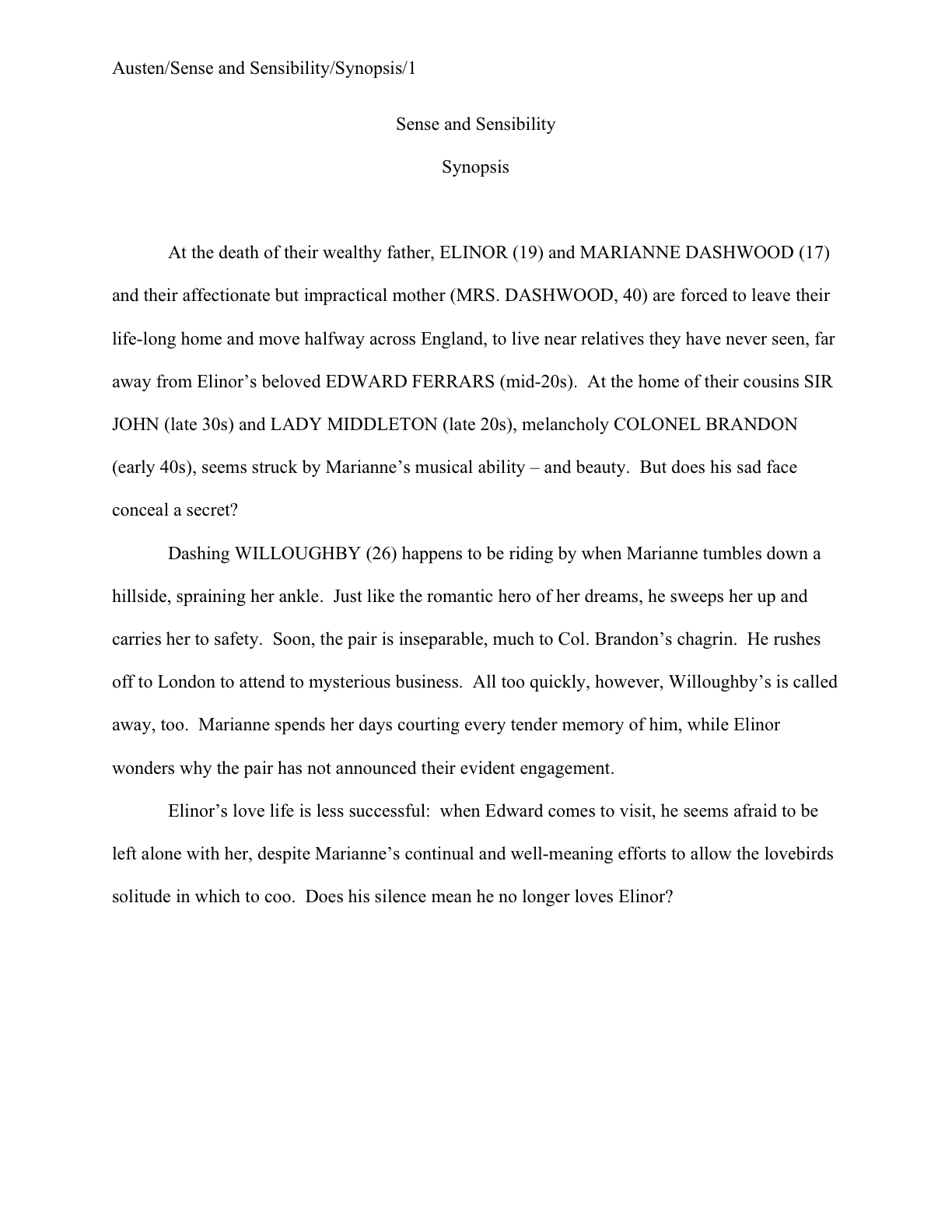

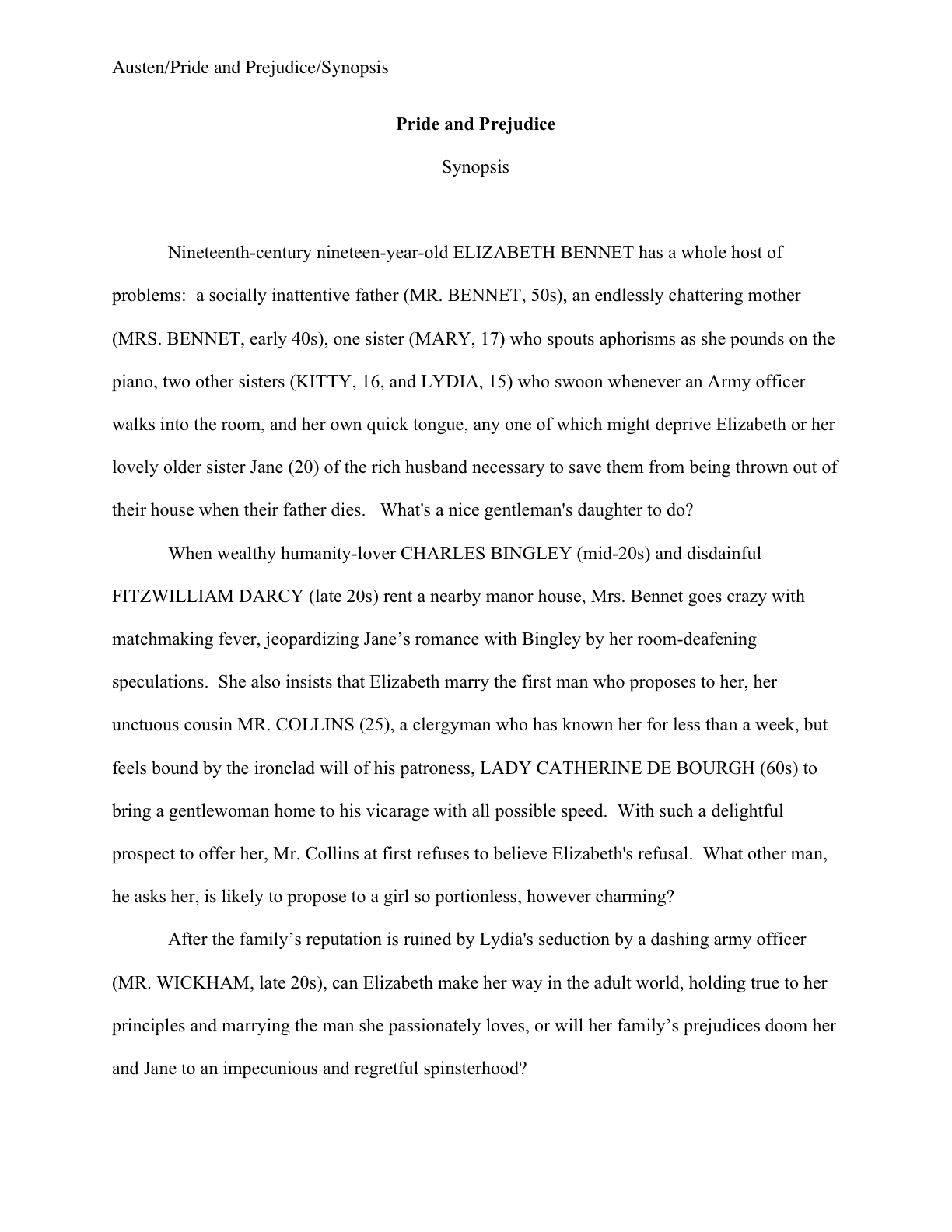
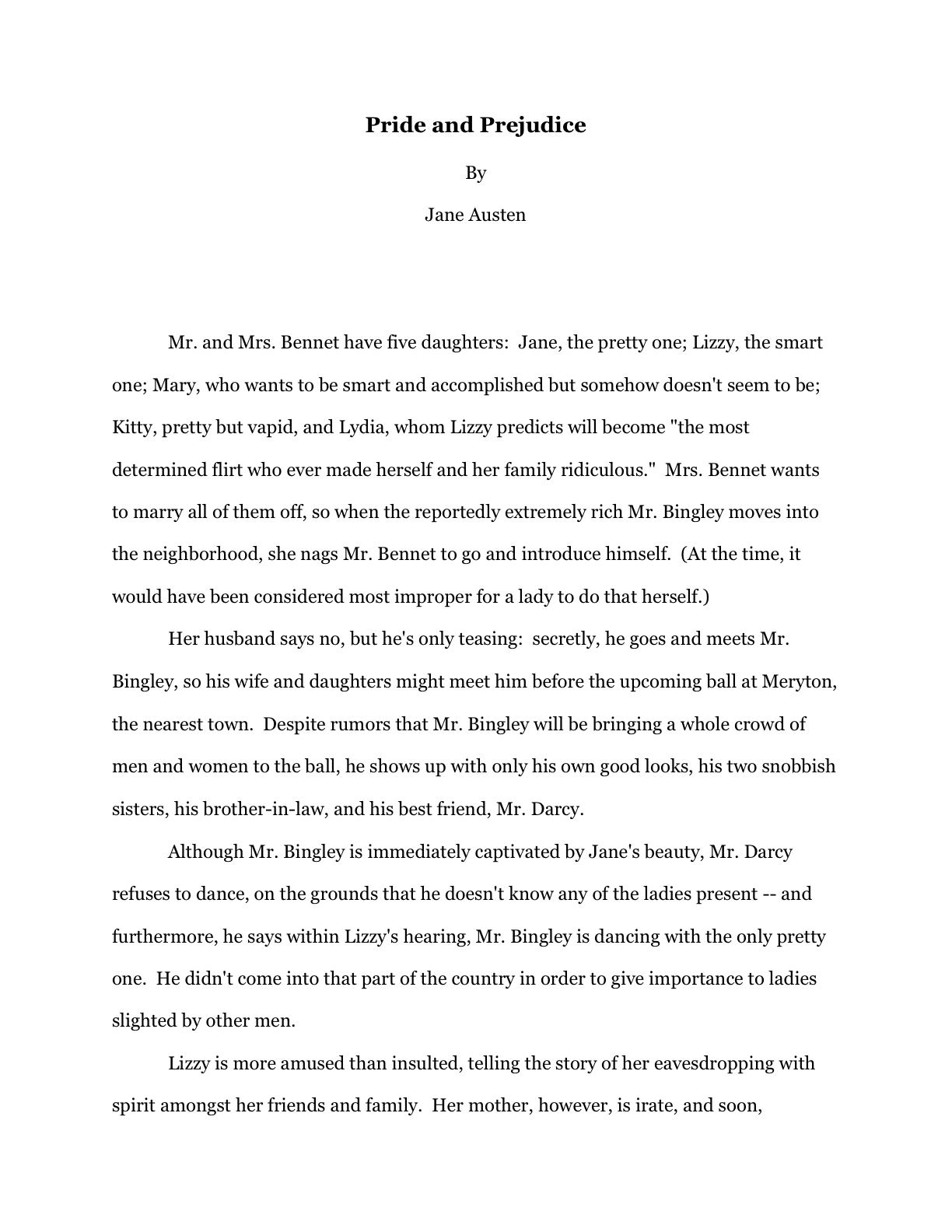
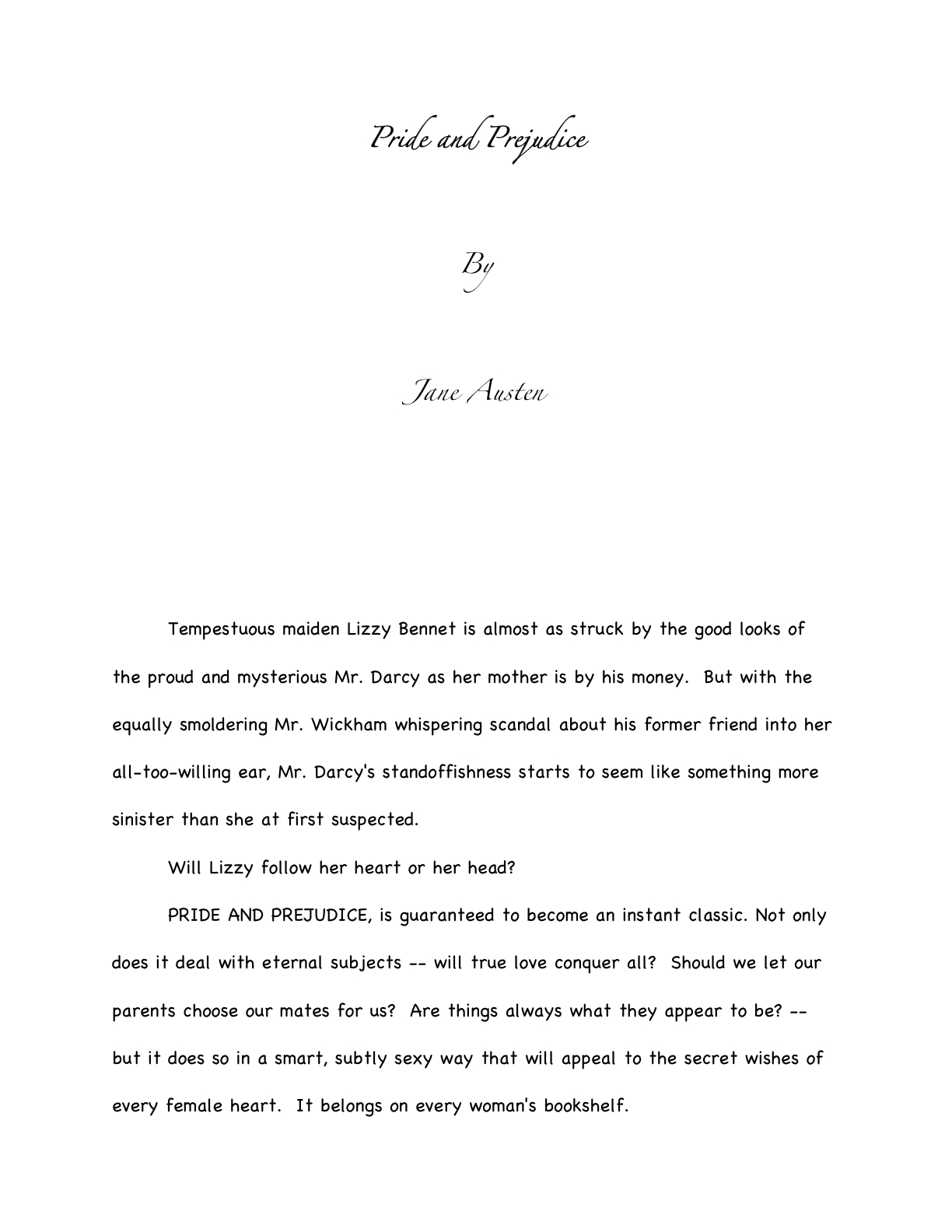

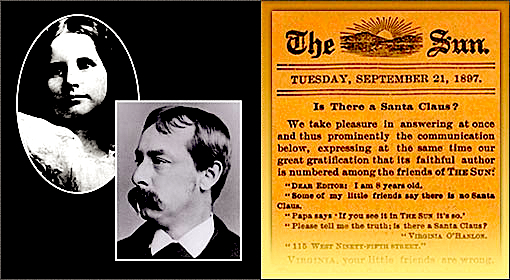
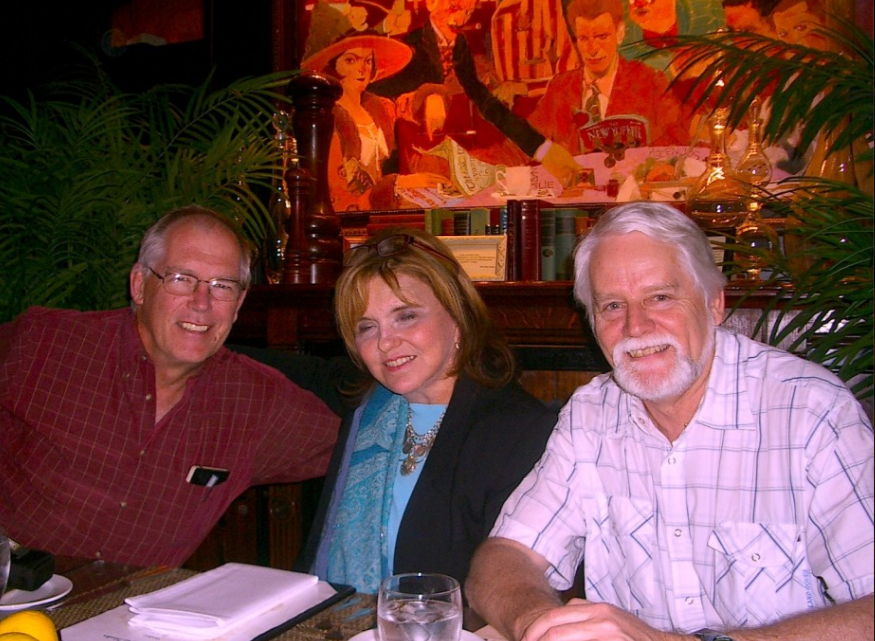
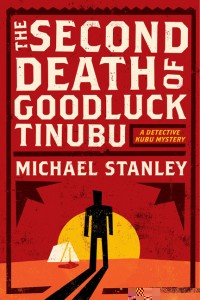
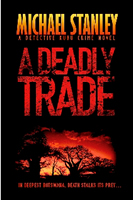 How can a man die twice?
How can a man die twice?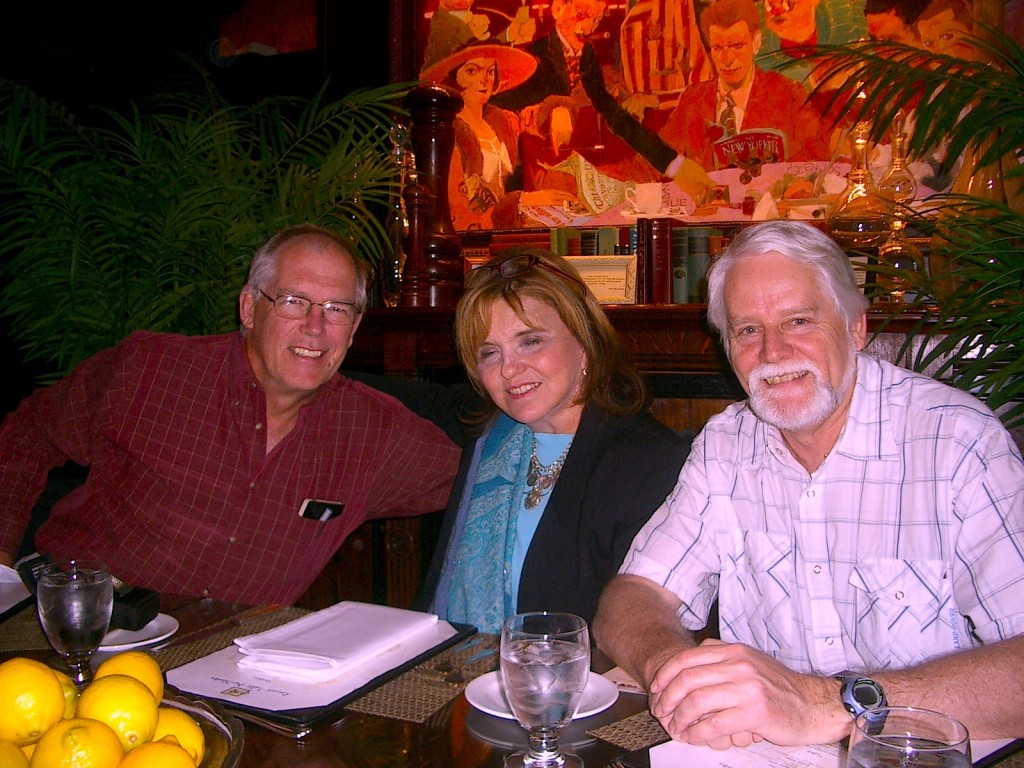
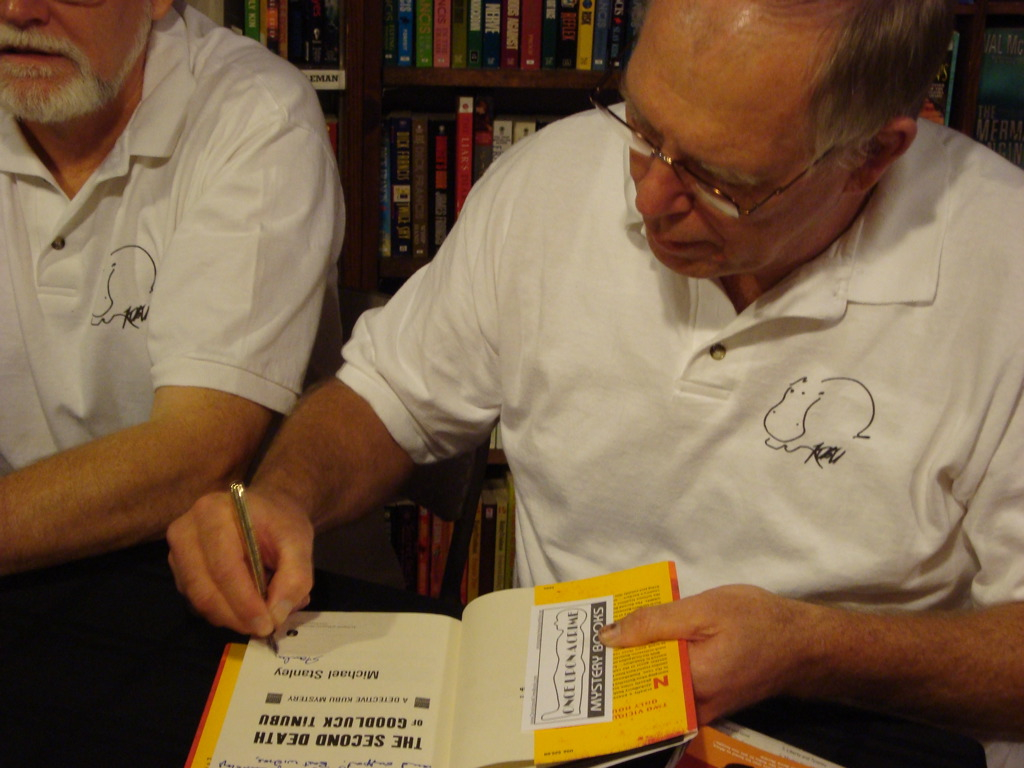
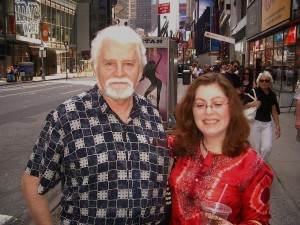
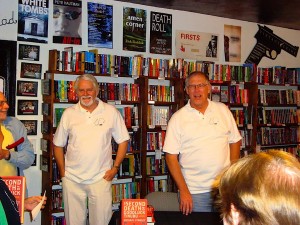
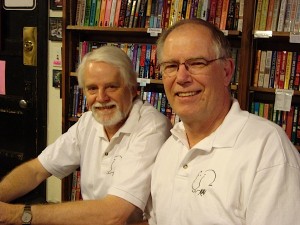
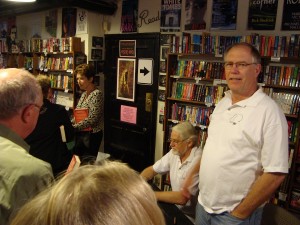
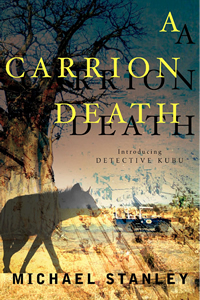
 Michael Stanley is the writing team of Michael Sears and Stanley Trollip.
Michael Stanley is the writing team of Michael Sears and Stanley Trollip. 


